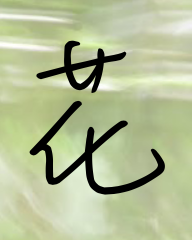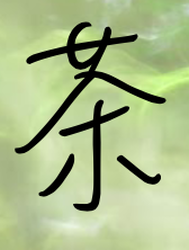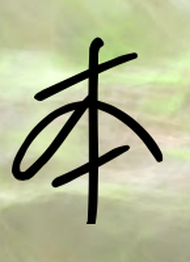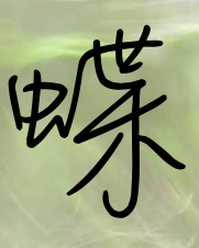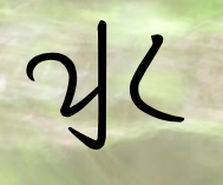|
I offer only a slide show: the stroke, the flow, of memory – the provision of some nine or ten tableaux: flowers arranged and given in some ikebana of recollection – the life-story of a flower, how when it rises out of water it suggests the very origins of life – where 'ma' is the space between and around things – like silence – the space between flowers – the space you can see: in a city as densely populated as Tokyo, I learned to find freedom in surprising places, amidst all that cramped and crammed humanity and urbanisation: here and there you could love a tree, or a little garden, or a hidden urban river – peace within all that futuristic architecture and those grim condominiums of concrete: in row after row of houses and shacks I learned the chrysanthemum and the sword and autumn colours and the mists: I experienced the formal etiquette of Tea Ceremony, and played ygo in a quaint, old tea-shop: I threw ceremonial beans to the masses during a festival (Setsubun) at a temple: I walked below chaotic power cables, and alongside the open gash of open sewers:
all the way to heaven blocks of concrete ladders of fire a dragonfly moves from star to star I went to Maruzen in central Tokyo, where you could have coffee and buy books which they wrapped in a smart paper package, a work of art: I experienced the Chichiba Yomatsuri – a night festival of fireworks and drum and flute – and in the severe cold I used a little hand-warmer, the more you squeezed and kneaded it, the hotter it became: I sang English folk-songs on stage at a festival in Mishima, within sight of Fuji: I saw a film called 'Yasha ga ike' (Demon Pond), in which a male kabuki actor played the female lead: there was harmony and detail in everything, even the bento lunch-box, which could represent, through the colours and arrangement of the food inside, the essence of spring (the whole thing came in an immaculate lacquered box): I learned about the spirit of the craftsman and his amazing, consummate carpentry, the beauty of wood and the co-existence of architecture and nature: they identify 3 stages of learning – 'to learn, to break away, to transcend': the alcoves (tokonoma) in old homes contained flowers and calligraphy and wall-hangings or a scroll, well-placed as the focal point, or setting, of the room – a room laid out with economy, and spare in design – humble and simple and plain with tatami matting: I went to Nikko – its Toshogu Shrine, its waterfall, and that three monkey wisdom of 'see no evil, hear no evil, say no evil': how there was no room at the inn, and how, as I walked at night down a deserted street, some young people from Tokyo picked me up in a car and took me with them to a minshuku – simple lodging in bunks: they saved me from a dangerous, cold night... then I read books, one by Kobo Abe – 'The Woman in the Dunes': a butterfly or insect collector goes to a remote coastal part of Japan, in search of a rare specimen, and finds a wild and sandy shore, and in the quiet, as he wanders about, he comes upon a deep pit amongst the dunes, with a hut at the bottom: suddenly, he is pushed from behind, and tumbles down the sheer slope into the pit: he has been ambushed by sand people, anonymous, mysterious, sinister, faceless: he is trapped down there, unable to climb the sides of the pit: a strange woman lives in the hut, and he is accepted by her, and they live together in these conditions, food and water being lowered down on ropes from above: some things are brought in by way of a rope ladder: for days, months, years, he lives down there, and slowly loses even the will to escape: he is totally subsumed into his new reality: one day the ladder is accidentally left there, a temptation, a chance escape-route: first of all he climbs up the ladder, and looks around on the shore: but then, strangely enough, he goes back down to his home there in the pit: he has lost his sense of the world outside: he has transcended his confinement, he is no longer really a prisoner – he is himself – real, a creature of the sand: and he is used to it, entirely, this reality, this miniature world of woman and dune... |

once I went to Himeji, and saw an ancient samurai castle – deadly, elegant, refined: and I went to the hills of Nagasaki – saw Glover's House: he was a Scot who long ago came to live in Japan: his house was furnished with large, western-style, wooden chairs – and it struck me what an assertive object a chair really is to someone used to living humbly on the floor: and at Nagano in the snow, in the Japanese Alps, at a disco, and after I had danced my turn, a lovely girl came over and presented me with her silver pendant to show her appreciation and admiration: in my final weeks in Japan, I was taken to see the Grand Shrine of Ise, with its extraordinary curved wooden sloping roofs: the family I was with took me then to an inn, where we all shared the same room: I went down to the public bath with the father of the family: our supper was brought to our room, where we ate on the floor at a long and low table: supper appeared in a large, aesthetically marvellous wooden boat, within which our sea-foods were artistically arranged: it is said in Japan, 'you eat with your eyes': at bed-time, the daughter of the family undressed behind a screen, and we all bedded down for the night on the ground, in our bedding, side by side...
my last days in Japan were fraught, as breakdowns began to overtake me: however, a class of girls said goodbye by garlanding me with chains of coloured origami cranes, which they hung around my neck to wish me long life: but on one occasion, I walked the streets with my brain actually pounding in my skull: I didn't know what was happening to me: Mr Maeda, my friend, took me to a cafe, called the Garden of Eden, and my paranoia increased dramatically: then we drank sake in a traditional olden-style tavern, with paper lanterns illuminating the scene: I also visited the massive fish-market in the city...
on my last evening, I went out into the violet light to a local bar to have beer and some grilled and delicious chicken-wings: I bought the men in there bottles of beer, and they really warmed to me, and we drank many toasts in Japanese, and I let my hair down, tried to talk to them in Japanese: and before I said goodnight, they went and got presents from their homes for me to remember them by, photos of o-mikoshi or portable shrines used in processions, or festivals: and when I got home, I stood on my balcony and sang loudly to the night a Bach aria, 'Erbarme dich': and I spent the whole night reading the New Testament: in the morning I boiled an egg: and in an odd mood of euphoria and fear, suspended as it were between life and death, and under the weight of the cosmos, theatrically and irrevocably, I broke the shell of the egg: and had my tea:
morning – somehow,
& the quiet
of tea
AND DAWN BROKE: IT WAS DEFINITION: IT WAS IMPERATIVE: AND MY ROOM WAS LIT UP WITH ROUGE AND GOLD – AND THE SUN FILLED MY MIND – THE RISING SUN, THE STARTLING, THE GOLDEN, THE FINAL AND SUBLIMINAL BIRTH, OF THE SUN...
my last days in Japan were fraught, as breakdowns began to overtake me: however, a class of girls said goodbye by garlanding me with chains of coloured origami cranes, which they hung around my neck to wish me long life: but on one occasion, I walked the streets with my brain actually pounding in my skull: I didn't know what was happening to me: Mr Maeda, my friend, took me to a cafe, called the Garden of Eden, and my paranoia increased dramatically: then we drank sake in a traditional olden-style tavern, with paper lanterns illuminating the scene: I also visited the massive fish-market in the city...
on my last evening, I went out into the violet light to a local bar to have beer and some grilled and delicious chicken-wings: I bought the men in there bottles of beer, and they really warmed to me, and we drank many toasts in Japanese, and I let my hair down, tried to talk to them in Japanese: and before I said goodnight, they went and got presents from their homes for me to remember them by, photos of o-mikoshi or portable shrines used in processions, or festivals: and when I got home, I stood on my balcony and sang loudly to the night a Bach aria, 'Erbarme dich': and I spent the whole night reading the New Testament: in the morning I boiled an egg: and in an odd mood of euphoria and fear, suspended as it were between life and death, and under the weight of the cosmos, theatrically and irrevocably, I broke the shell of the egg: and had my tea:
morning – somehow,
& the quiet
of tea
AND DAWN BROKE: IT WAS DEFINITION: IT WAS IMPERATIVE: AND MY ROOM WAS LIT UP WITH ROUGE AND GOLD – AND THE SUN FILLED MY MIND – THE RISING SUN, THE STARTLING, THE GOLDEN, THE FINAL AND SUBLIMINAL BIRTH, OF THE SUN...
Tony (A.A.) Marcoff is an Anglo-Russian poet who has lived in Africa, Iran, France, and Japan. He writes mainly tanka and tanka prose now, but has also had many mainstream poems published in Poetry Review and other journals. Tony has been a university librarian, teacher, and occupational therapy helper in a large psychiatric hospital, where he was in charge of poetry and creative writing. He now lives in England near the beautiful River Mole, which is his meditation and inspiration.
Use and/or duplication of any content on White Enso is strictly prohibited without express and written permission from the author and/or owner.
Proudly powered by Weebly
